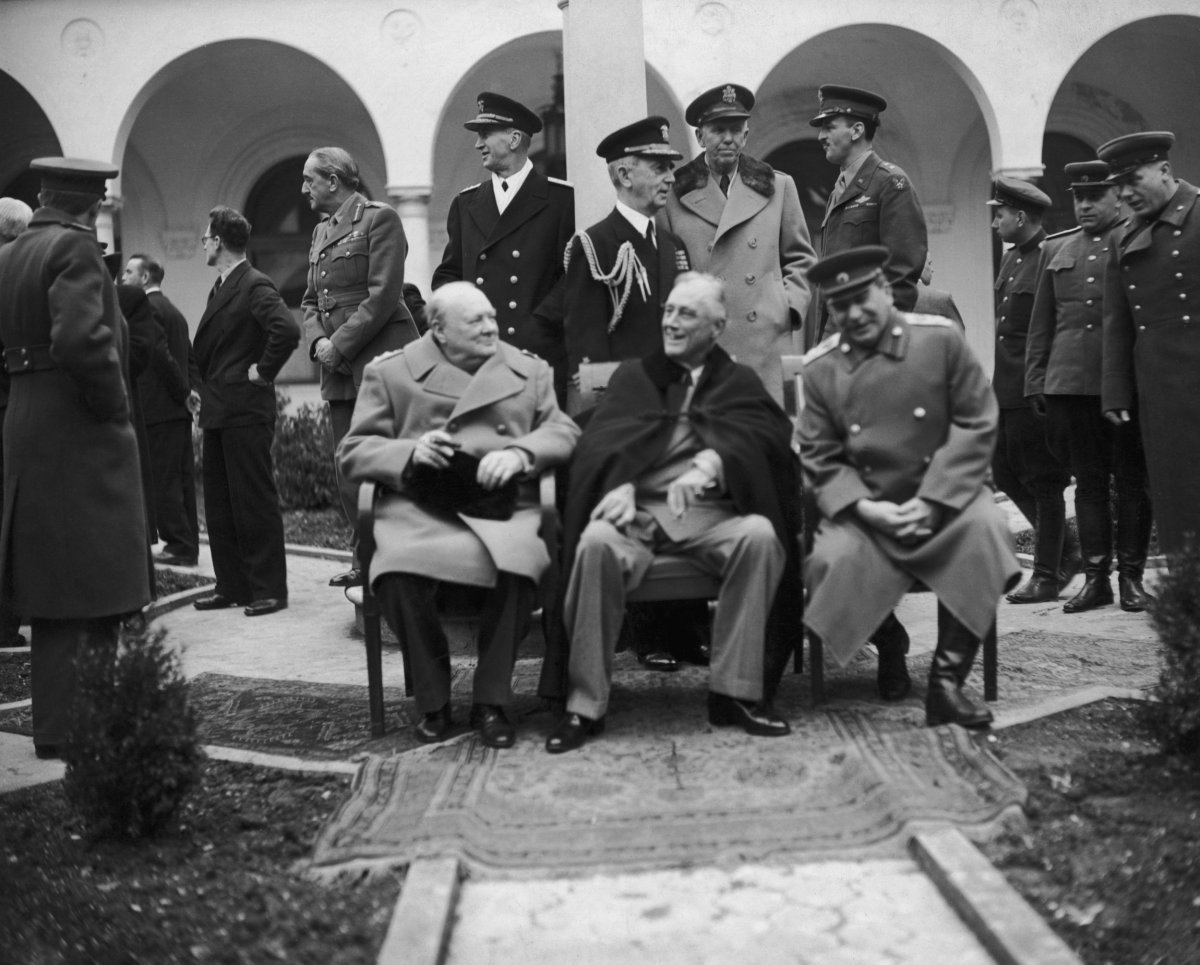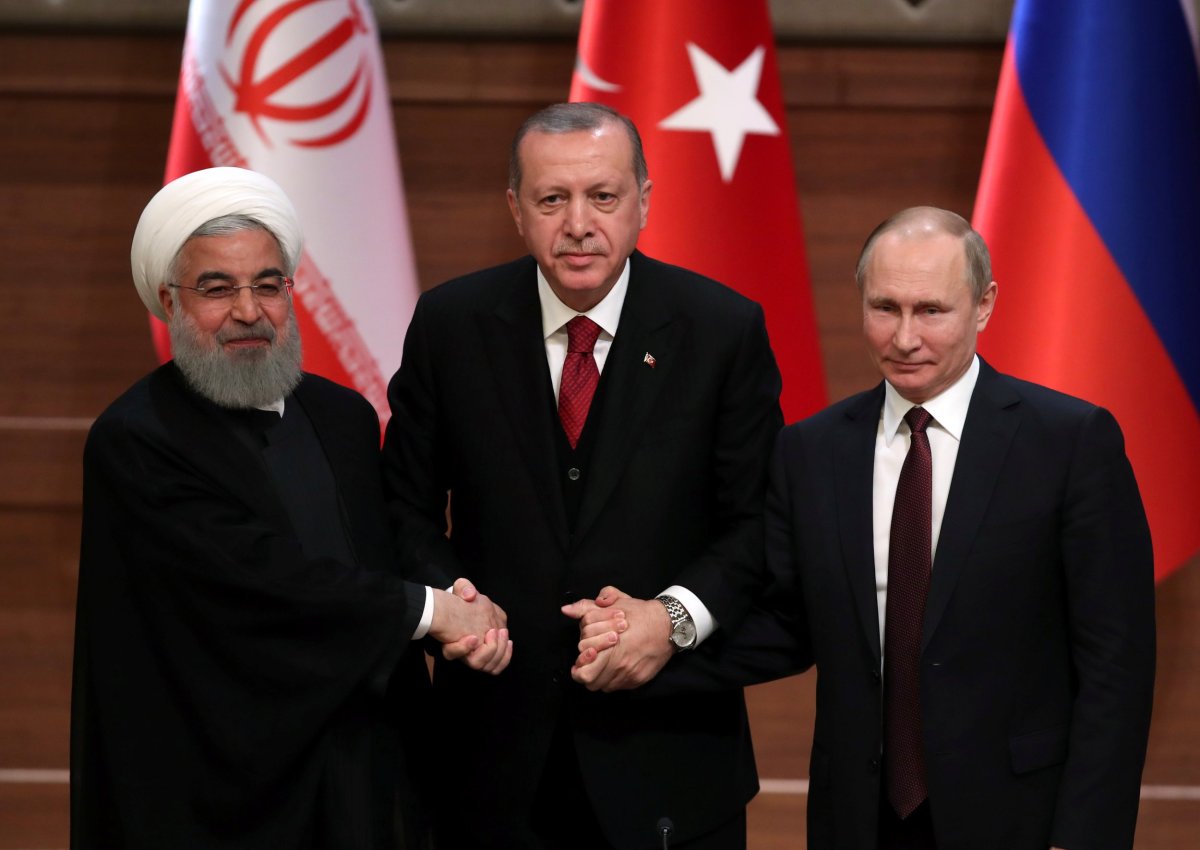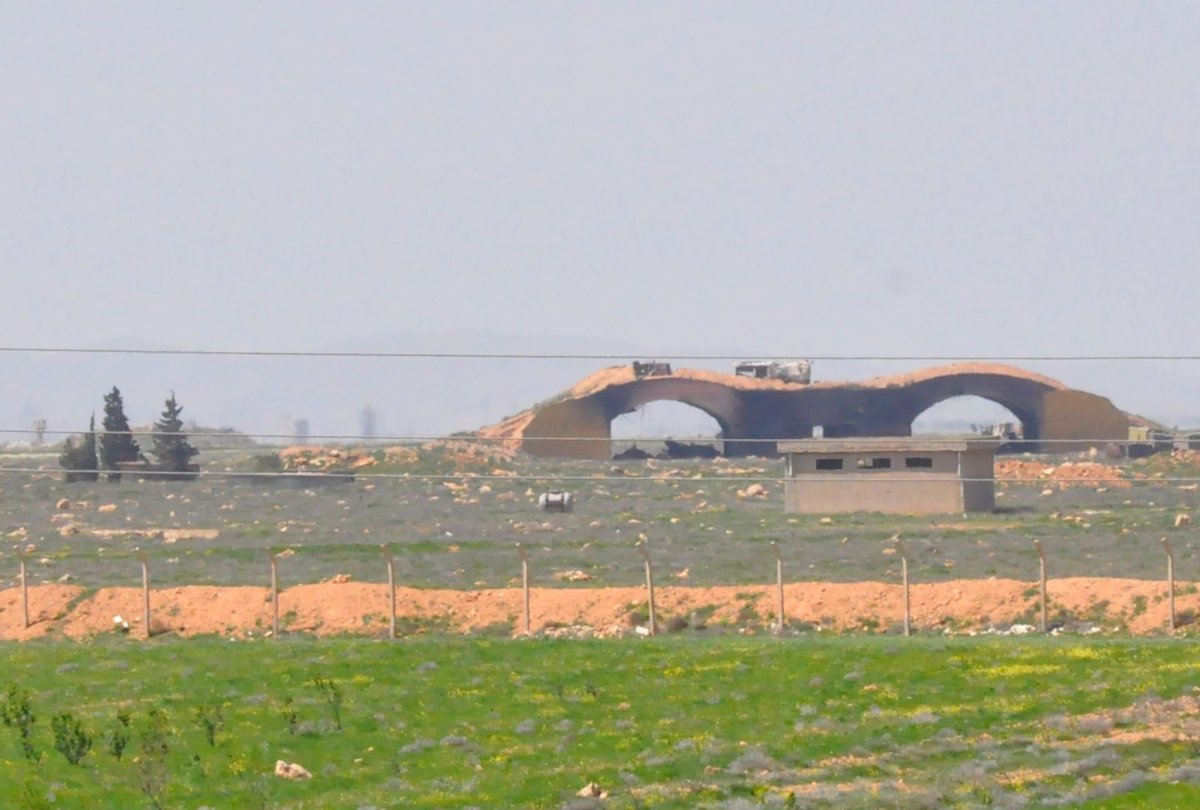Despite the recent and necessary American-Franco-British airstrikes against President Assad's chemical weapons infrastructure, the United States is losing in Syria and condemning its oppressed citizens and freedom fighters to lose as well.
As President Trump plans to withdraw U.S. forces there, Presidents Putin of Russia, Rouhani of Iran, and Erdogan of Turkey wrapped up another summit, consolidating even more power and influence in the region at the expense of America's allies. The order of the Middle East is at stake, our country must re-engage. America, the most powerful nation in the world, should be driving policy.
Sometimes pictures speak crucially. Two photographs of powerful triumvirates in the 20th and 21st centuries cry out for a change in U.S. policy, halting our diminishing role in the world and its cost to humanity.
In the first picture, U.S. President Franklin Delano Roosevelt, British Prime Minister Winston Churchill and Soviet Premier Joseph Stalin at Yalta anticipate victory in World War II. Roosevelt bridges the gap between Churchill and Stalin, confirming America's leadership.

In the second picture, Turkey's religious zealot, Recep Tayyip Erdogan, hosts the latest summit of self-aggrandizers, holding hands with Russia's modern-day tsar Vladimir Putin and Hassan Rouhani, the public face of Iran's fundamentalist theocracy. At the last summit in Sochi, Rouhani was overjoyed that Russia, Iran and Turkey were creating a "new Middle East."
At this latest summit, the Iranian president lashed out at the "illegal presence and interference of the United States in Syria," blaming Washington for the country's disintegration. Never mind that Iran poured in thousands of troops and its terrorist proxy militias, led by Hezbollah, to prop up the brutal barrel-bomb dropping regime of Bashar al-Assad.

Washington's absence is an appalling failure in foreign policy. It allows three autocratic governments to advance, a murderous dictatorship to survive, and the chance of democratic engagement in the region and the world to fade. With the help of the Trump administration's own "National Security Strategy" the situation can be amended.
There are precedents.
Washington's constructive role in the 20th century began in 1905 when President Theodore Roosevelt coaxed Moscow and Tokyo into signing the Treaty of Portsmouth, ending the Russo-Japanese War. A couple of months after Yalta in mid-century, Franklin Roosevelt died, but the Marshall Plan of Harry S. Truman, Roosevelt's successor, enabled post-war Europe to rebuild, including the creation of a democratic and friendly West Germany.
In the 1980s, Ronald Reagan's tough stance toward the Soviet Union led to a treaty that reduced nuclear weapons and helped bring down the Iron Curtain. In 1995, Bill Clinton witnessed the Dayton Accords among Serbia, Croatia and Bosnia Herzegovina, ending the horror of mass murder in the Balkans. 20th century America led the effort to build a better world, and nations depended on that.
In the 21st century, that crucial role has often been abdicated. Barack Obama tried to sidestep crises, naively dismissing emerging Islamic State militant group (ISIS) terrorists as a "J.V. team." He threatened to bomb Syrian President Bashar al-Assad's installations because he used chemical weapons but didn't follow through. His red lines were pale, and his attempts to lead from behind were pale policy. Russia, Iran and its Shiite militias, and with their aid murderous Assad, unleashed devastating attacks on any opposition in Syria, including America's Arab and Kurdish allies.
Enemies advanced destruction, chaos, and despair, and by the time Donald Trump took office, Iran was asserting itself across the Middle East, not just in Syria and Lebanon, where Hezbollah dominates the national army, but in Iraq and Yemen as well.
After an Assad chemical weapons attack a year ago, Mr. Trump correctly fired 59 missiles at the Syrian air base that launched a chemical weapons massacre. Along with the British and French, he now authorized the attack with 105 Tomahawks for the gassing of civilians in Douma, a second right move. But in a war filled with atrocities, including many more chemical weapons attacks over the course of the civil war, missiles fired on two occasions are a small gesture and, with Assad and his Iranian and Russian backers poised to recapture the last remaining stronghold of the Syrian opposition, too late to ensure a moral outcome in this modern-day tragedy that cost half a million lives.

Mr. Trump is perplexingly outsourcing American policy in Syria. At the Asia Pacific Economic Cooperation summit in Vietnam last year, he bowed out of participating in the structuring of a peace agreement, yielding leadership to Russia's Putin, and he has now twice confirmed his intent to bring home American troops.
In contrast, America's "National Security Strategy" commits us to "counter Russian subversion." It correctly identifies Iran's theocracy as "the world's leading state sponsor of terrorism" and commits Washington to "neutraliz[ing] Iranian malign influence." Apparently unimpressed or unaware of that, when Mr. Trump was charged with introducing the policy, he instead highlighted Mr. Putin's gratitude for a CIA warning that enabled Moscow to capture jihadist terrorists.
The Kremlin, Iran and Turkey threaten anti-Assad groups and attack America's Arab and Kurdish allies. Russia mouthed a decision to have the Kurds at the negotiating table but withdrew its troops in Northeastern Syria so that Turkey could unleash air strikes and a ground invasion against Kurds in the region.
Washington's dream of peaceful ethnic, cultural and religious groups living in harmony in the Middle East has become a nightmare in which Moscow, Tehran and Ankara have their way. Russia has become the major power broker in the region, fortifying its naval base in Syria's Mediterranean port of Tartus and an air force base in Khmeimim, giving the Kremlin its greatest military foothold in the region.
Washington must respond as the "National Security Strategy" suggests, reasserting its support of Arab and Kurdish allies by opposing Iran, Russia and now also Turkey.
In a recent whirlwind victory lap of Turkey, Syria and Egypt, Putin revealed his intent to create client states. Moscow is bustling. Already infamous for nuclear installations, missiles and missile defense systems in Iran, Putin sought to reestablish Russia's alliance with Cairo. Having already sold S-400 surface-to-air missile batteries to Turkey and installed them in Syria, Moscow contracted to sell weapons to Egypt. In response, Cairo has granted Russia air force landing rights on Egyptian military bases.
Iran, boosted by the windfall of the nuclear deal, is also bulking up. Major General Qasem Soleimani, the commander of its Quds Force, blatantly defies UN international travel sanctions. He flew to Moscow and met Mr. Putin before Russia entered the Syrian war, and he has popped up in Iraq as a "military adviser" to the Shiite Hashd al-Shaabi forces that together with Hezbollah have ethnically cleansed wide stretches of territory to gain Iran a corridor through Iraq, Syria and Lebanon to the Mediterranean. This not only provides a ground route for weapons to Assad and the Lebanese Iranian factotum, terrorist Hezbollah. It also positions Iran to attack Israel from short distances by land, air and sea.
Once Sunni-Shia adversaries, Iran and Turkey, lusting for power, have three common aims: crush the Kurds, back Qatar in the dispute with Saudi Arabia and the UAE, and take on Israel. Mr. Erdogan, a defender of the fundamentalist Sunni Muslim Brotherhood, somehow sees himself as advancing the re-creation of the Ottoman Empire through an alliance with radical Shiite Iran. There is no morality involved.
Turkey idly stood by as ISIS attacked the Kurds in Kobani, launched its ironically named "Operation Olive Branch," an incursion into northern Syria to pulverize the Kurds, and, as with the Ottoman genocide of the Armenians and Assyrians, will in partnership with Iran keep attacking the Kurdish people, who gallantly helped to defeat the Islamic State.
Aware that Mr. Trump is failing the Kurds, Israel has been protecting itself by attacking arms and weapons research facilities as well as an Iranian base under construction in Syria. Though well-armed and bold, Israel is a small country. Alerted to the danger Israel and other allies confront, the U.S. should block Iran from co-opting Syria, stop the Turks from attacking the Kurds and lead negotiations that will result in a balanced resolution of the war in Syria, from which all foreign countries, including the U.S., withdraw.
The "National Security Strategy" recognizes a need to protect American allies in the region, and Mr. Trump should do so for the Kurds, who suffered thousands of casualties to defeat ISIS and are crucial to regional balance. The U.S. should protect our Arab and Israeli allies as well. The viciously crushed Iranian people's movement is over for the time being, but the people's plight lives on, and America must support them by taking economic and political action against the kleptocratic theocracy that is suppressing them.
Moscow, Tehran and Ankara must be prevented from building their "new Middle East." President Trump, who is not averse to reversing himself, must reassert Washington's commitments in region. The world needs American leadership, working toward justice and peace.
Jonathan Wachtel served as Director of Communications and Spokesperson for the U.S. Mission to the United Nations. As a journalist he covered global conflicts for ABC, Fox and Worldwide Television News. Albert Wachtel, a professor at the Claremont Colleges, has written for many national journals and newspapers. He has four books out and ran for Congress in 1992.
The views expressed in this article are the author's own.
Uncommon Knowledge
Newsweek is committed to challenging conventional wisdom and finding connections in the search for common ground.
Newsweek is committed to challenging conventional wisdom and finding connections in the search for common ground.
About the writer
To read how Newsweek uses AI as a newsroom tool, Click here.








